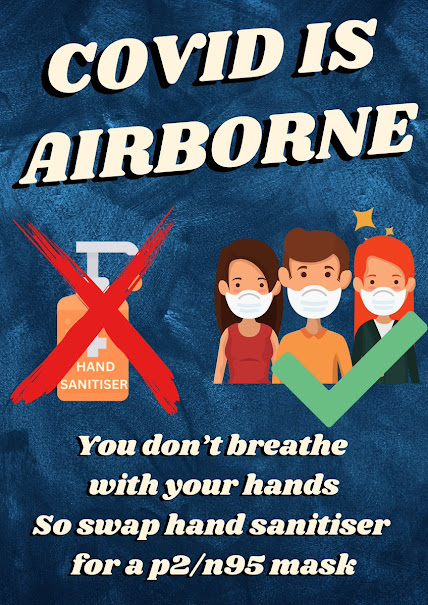I just watched Painkiiller about the Purdue Pharma, Sacklers, oxycontin scandal. It's okay background viewing - less entertaining if you know the whole story already - except the occasional testimonials from the families of real victims was an excellent addition. They absolutely destroyed me.
An important piece of the puzzle around getting such an addictive drug approved for common use was that a letter to the editor in a highly ranked journal that speculated that oxycontin is believed to have a 1% addiction rate, was enough (plus some shmoozing involving young women) to get the drug cleared by the FDA. The author of the letter was later astounded that his unsubstantiated comment in a letter was enough evidence for the drug to become widely distributed.
That's kinda what's going on with the push around hand washing.
Here's a great, extensive takedown by Lazarus Long, on the questionable studies being used to suggest that handwashing does anything significant to reduce the rate of Covid transmission. This implicates, by extension, all the doorknob and railing washing by school janitors.First, what does work: Covid is airborne - it hangs in the air for hours and is able to cross a room in minutes. Therefore, if we have any hope to reduce transmission through our own personal behaviour, it's with well-fitting N95s or better. Just wear a mask! Other possible personal options include nasal-sprays to prevent inhalation of viruses. Beyond that, we need hospitals and schools and all buildings to improve ventilation (at least 6 ACH or allow open windows), add room filtration (CR boxes), and add in the upper room UVGI. Just doing one of the three is not enough.
Also, it's great to wash your hands. Absolutely. It's just not the thing that will protect you from getting Covid the way many public health offices are suggesting. You don't get Covid from touching a doorknob, then touching your face. You get it from inhaling air with the virus in it.
From John Hopkins:
(Picky point: Covid is actually a vascular disease, but it still gets in through inhalation from the air.)
Here's the gist of the problems with the push for hand washing (in my own words abridged from the lengthy thread):
The CDC explains that we get germs when we touch things and touch our face, but doesn't mention Covid in their "explain the science" page. Nor do they differentiate between biome and pathogens, but, anyway, Lazarus scrutinized their sources:
They claim that hand washing reduces respiratory illnesses by 16-21%, but the study they cite found that "teaching people about handwashing helps." They didn't study if the rate of hand washing itself correlates with lower respiratory illness, but that more educated people have lower illness rates. "The authors themselves call into question the specificity of recommending hand washing hygiene for infectious disease, much less respiratory diseases."
Then he looked at a meta study compiled of eight studies. In the first study that found a reduce in respiratory illness, it included pink eye, headaches, fever, and other conditions that created confounds. AND the primary author was Dr. David Dyer who developed the hand sanitizer used in the study, which is a huge conflict of interest.
The second study found hand washing promotes wellness in child care settings, but the study doesn't clarify what was actually measured: "We actually do NOT KNOW what the children were taught."
The third study conclude there's a "34% decrease in 'sickness', (probably mostly gastroenteritis)" after educating children and parents about hand hygiene. Again, it didn't show that handwashing itself reduced illness, and it didn't look at respiratory effects.
The fourth study, which actually compared a group with scheduled, mandatory hand washing to one without, found "The difference in absence due to respiratory symptoms was not statistically significant."
The fifth study trained child-care providers to wash their hands after helping children blow their nose in one group compared to no training in another and found, "no significant reduction in colds."
Another study found a 45% reduction in respiratory illness from hand washing in the military. Lazarus has a military background and is all over the methods for this study which have a huge confound because they don't control for privates vs others, and there's a huge difference in living quarters, etc. among different ranks. Furthermore, it doesn't control for a vaccine that was administered in some years and not others. AND they come to the conclusion that "handwashing may be more effective against the less-virulent rhinoviruses."
By the way, Covid can be extremely virulent.
Another study, co-authored by Dyer again, found that, lo and beyond, "students using hand sanitizer were 33% less likely to have been absent because of illness when compared with placebo group." That sounds great, but, once again, they gave one group (parents, children, and teachers) information and not the other group, and part of that information campaign was about the importance of good attendance. Nobody monitored if the product was ever used or if kids were absent because of respiratory viruses.
This is the "educational" video they watched:
Finally, the meta analysis itself clarifies a conflict of interest with a soap company:
Feel free to share this take-down with administrators pushing hand washing over mask wearing! Remember it's not bad to wash your hands. It's just not the solution to prevent the ongoing deaths and disabilities that you might think it is.




No comments:
Post a Comment